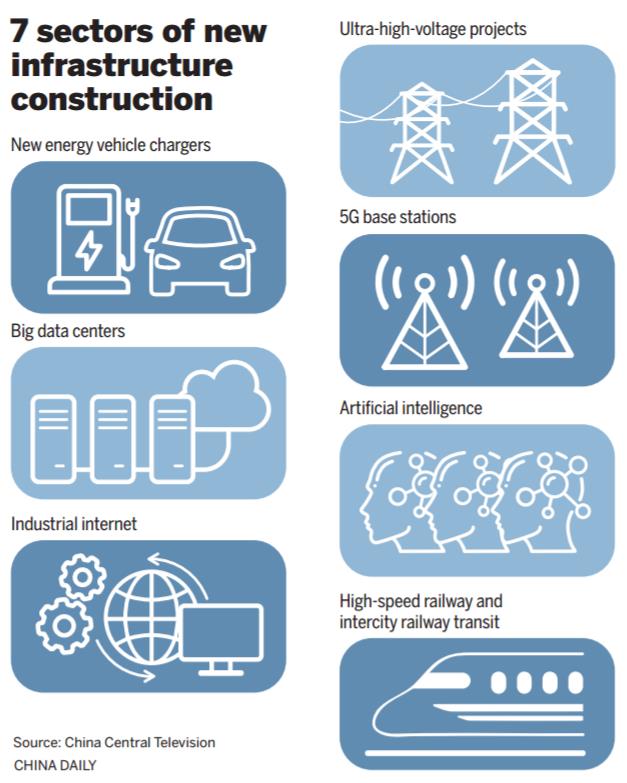Digital infrastructure key to growth
By Ouyang Shijia | China Daily | Updated: 2020-03-19 10:14

"Investment in infrastructure, especially new forms, will be the most effective means to stress countercyclical adjustment amid the mounting downside pressure," Chen added. "In the short term, it will stimulate investment and offset economic slowdown. In the long term, it will promote the transformation and upgrading of traditional industries, generate innovative business models, boost new consumption powered by digital technologies, keep employment stable and foster high-quality development."
Today, China's economy is transitioning from a phase of rapid development to a new stage of high-quality development, with a key focus on innovation-driven and sustainable economic growth.
Up until now, a total of 25 provinces and municipalities have emphasized new infrastructure to pursue high-quality development, with 21 intending to promote 5G network construction.
Zhu Jianfang, chief economist at CITIC Securities, said in a report that investment flowing into new infrastructure projects is expected to surpass 2 trillion yuan ($285 billion) this year, accounting for 10 percent to 15 percent of investment made into all infrastructure projects in 2020.
It is believed China will need to achieve an average of 5.5 percent GDP growth this year to meet its target of doubling the size of its economy from 2010, a key goal for the country to achieve the aim of creating a moderately prosperous society in all aspects, another report released by GF Securities noted.
Cui Lili, director of the Institute of E-commerce at Shanghai University of Finance and Economics, said China is ramping up efforts to deepen supply-side structural reforms and foster new growth drivers, adding that the future direction of China's growth can be witnessed in its massive spending on new infrastructure.
"As the coronavirus outbreak is curbing consumption, we need massive investment to boost growth, especially new infrastructure projects that will drive the development of traditional industries," Cui said. "During this period, we've also seen many sectors embracing digital transformation. I believe the society as a whole will have a better understanding of future changes brought about by new infrastructure."
Yang Yiqing, deputy director of the Institute for Zhejiang Merchants Development at Zhejiang Gongshang University, said: "China is at the forefront of some new economy fields around the globe, especially in e-commerce and digital payments. The massive spending in new infrastructure will help improve the industrial structure and inject new impetus into the economy. And China will be able to gain key momentum and leading advantages to foster high-quality development in the future."
Yang added that different regions should build new infrastructure projects in line with their own conditions. "While traditional infrastructure projects are usually built in less-developed central and western regions, the new projects will be mainly in economically-stronger regions".
"More importantly, we need to create a market-oriented and enterprise-led mechanism to build new infrastructure projects," Yang said.
Better cooperation between government and business is increasingly becoming a trend. Earlier this month, Chinese internet giant Alibaba Group signed a strategic cooperation agreement with Yuhang district of Hangzhou, Zhejiang province, to accelerate construction of a series of digital infrastructure projects.
Since the coronavirus outbreak, Alibaba has partnered with 28 provinces, autonomous regions and municipalities across the nation to build a digital epidemic prevention system. With the support of Alibaba's cloud storage, 180 million students and 200 million workers can study and work from home, which helps ensure the normal operation of society and economic stability.
Chen, from the Zhongjing Digital Economy Research Center, said more efforts are needed to cultivate professional talent and resolve any issues they may face such as funding difficulties and lack of supportive policies.
"Both central and local governments need to be better prepared to make an overall plan for new infrastructure, respect market regulations, stimulate market vitality, attract more social capital to invest in new projects and be more cautious to prevent hidden risks," Chen added.
Yang Ping, a researcher at the China Academy of Macroeconomic Research of the National Development and Reform Commission, cautioned that the focus on new infrastructure does not mean introducing strong stimulus policy measures.
"This year we will continue to speed up new infrastructure construction such as 5G, data centers and the industrial internet. And we will also focus on addressing weak links such as the emergency supply reserve system and public health services system," Yang said.
























